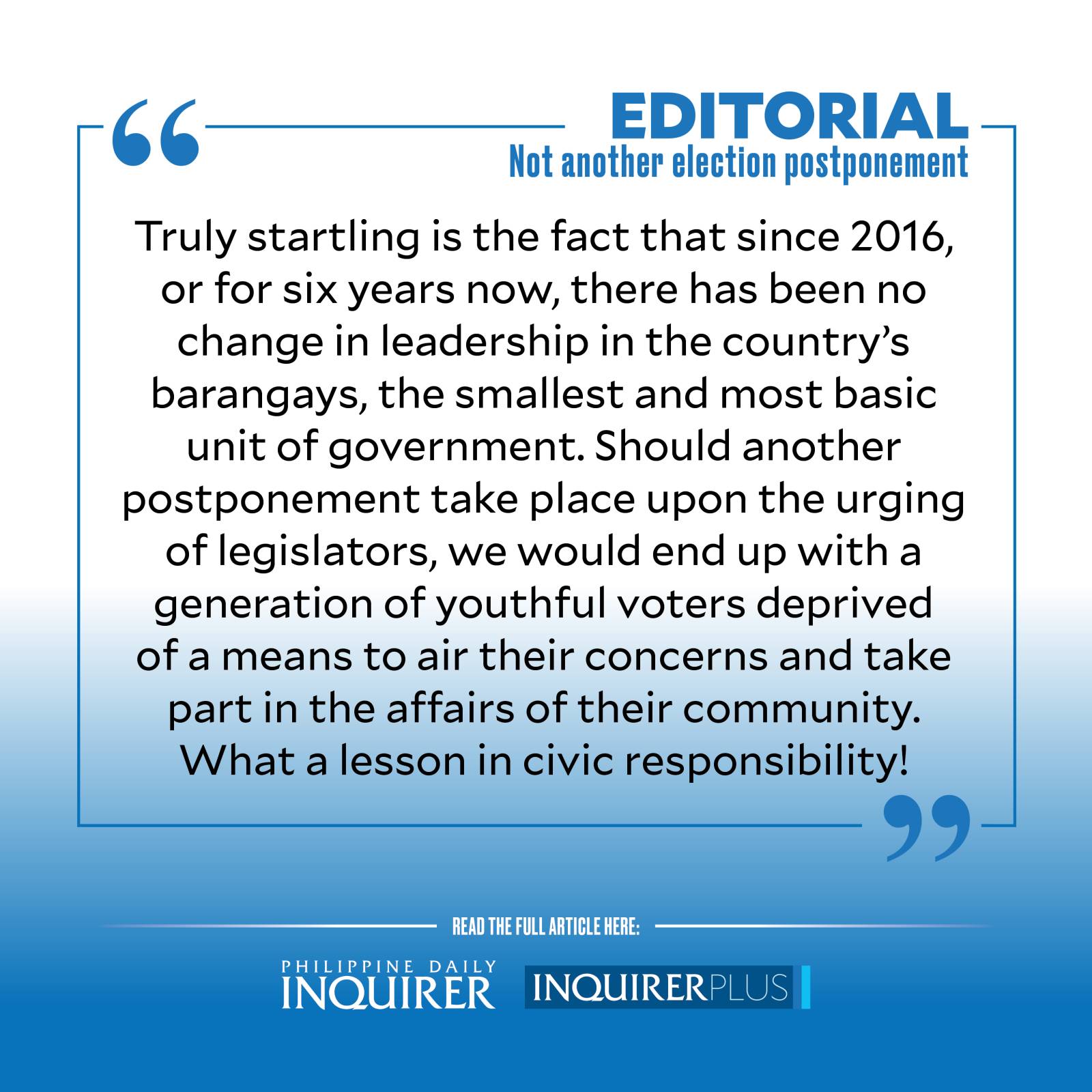
Truly startling is the fact that since 2016, or for six years now, there has been no change in leadership in the country’s barangays, the smallest and most basic unit of government. Though considered nonpolitical, the barangay leadership, including the youth council or Sangguniang Kabataan (SK), is tasked with looking after the welfare and safety of citizens. Barangay leaders are the ultimate implementors of laws, policies, and services crafted by and originating from national, regional, and local bodies, as acutely felt during the quarantine and lockdowns implemented at the height of the COVID-19 pandemic.
As a briefing on the Constitution states, “as the basic political unit, the Barangay serves as the primary planning and implementing unit of government policies, plans, programs, projects, and activities in the community, and as a forum wherein the collective views of the people may be expressed, crystallized and considered, and where disputes may be amicably settled.”
In brief, the barangay council is a microcosm of government as a whole, where citizenship is ultimately recognized, exercised, and rewarded.
And yet, as events have shown, the powers and authority of the barangay seem to be more honored in the breach, and as the continuing postponement of elections for barangay positions has shown, largely ignored and blithely overlooked.
Which is why the news that a number of senators and congressmen have either filed bills or expressed opinions calling for yet another postponement of the barangay polls scheduled for this December is so disturbing. If moved, it will be the fourth time the barangay and SK polls would be postponed since October 2016.
Is the casual dismissal of the need for “new blood” in the most basic level of government a reflection of the indifference with which national authorities hold the humblest citizens?
One such bill, filed by Sen. Francis “Chiz” Escudero, seeks “to bolster the stability and consistency of public service at the barangay level.” Postponement, he argued, would allow local officials to “address the country’s present problems, including the COVID-19 pandemic, high oil prices, inflation, and poverty.” Escudero also sought to “realign” a portion of the budget for the barangay polls, amounting to P8.44 billion, “towards interventions aimed at sustaining the current momentum” in addressing the many problems the nation faces.
Sen. Jinggoy Estrada, Davao Oriental Rep. Cheeno Miguel Almario, and Leyte Rep. Richard Gomez have also filed similar bills seeking to postpone the elections to different dates.
Opposing the move are voter education and election watchdog organizations who say it is “high time” for ordinary citizens to assess their local officials and either reward them for a job well done or penalize them for their poor leadership or worse, for such offenses as corruption and nepotism.
Certainly, six years is a long time to let leadership at the basic level continue without oversight or accountability. As for using the P8 billion for other uses, some have pointed out that the amount has already been earmarked for the polls, and that there is no guarantee that the amount will be disbursed for more urgent needs. Case in point: the use of P100 million for the renovation of the Batasang Pambansa Session Hall in time for Monday’s State of the Nation Address, which is hardly a national emergency. Talk about priorities.
Lawmakers will always find excuses to postpone and defer elections. So what will stop them from moving the polls come the appointed time?
Lawyer Ona Caritos of the Legal Network for Truthful Elections points out that another postponement of the barangay elections “would deprive the Filipino people of their right to choose their local leaders and assess their performance in the past years, including their COVID-19 response.” Others point out that after six years of polls postponement, many of the current SK officials, who are supposed to represent the youth, no longer qualify as “youth.”
Moves to defer the elections also came late in the day, as the Commission on Elections had started preparing for the barangay and SK polls as early as June. The Comelec wants Congress to decide soon so the poll body can proceed with procurements still pending for the upcoming elections in less than five months.
Voter registration resumed on July 4, and will end today. As of July 21, the poll body said, there is a total of 2,119,878 new registered voters, more than 1.3 million of whom belong to the 15-17 age bracket. These new voters deserve to exercise their right to vote for their leaders and not to be left to holdovers who have been entrenched in position for long.
Should another postponement take place upon the urging of legislators, we would end up with a generation of youthful voters deprived of a means to air their concerns and take part in the affairs of their community. What a lesson in civic responsibility!